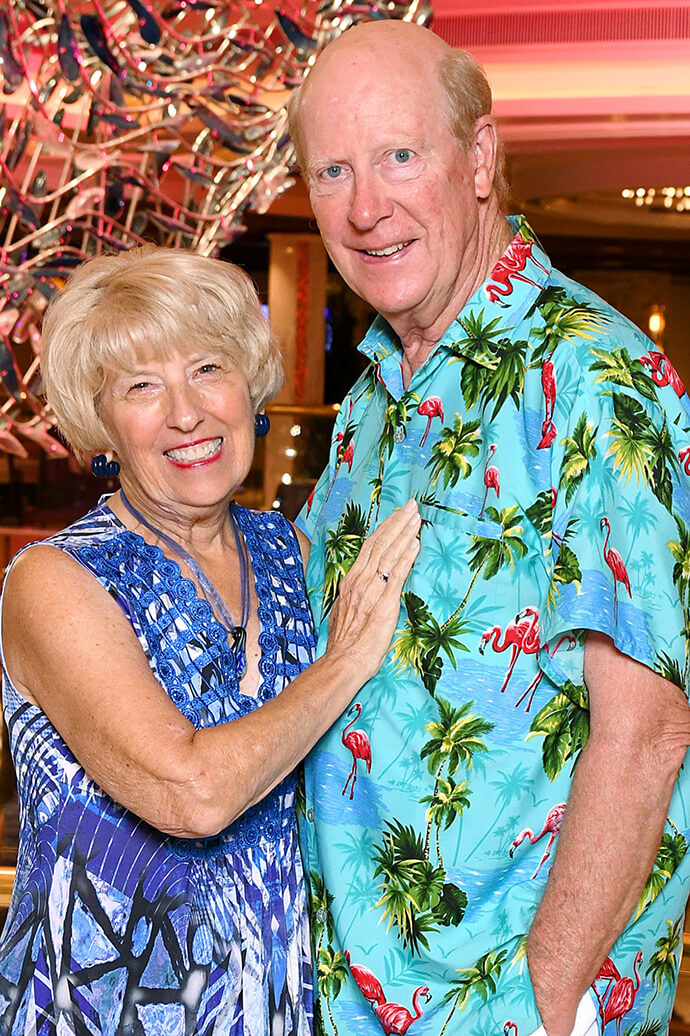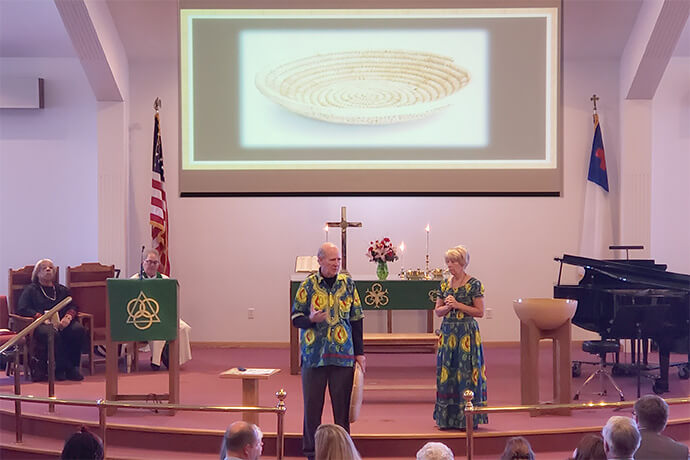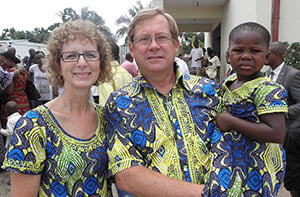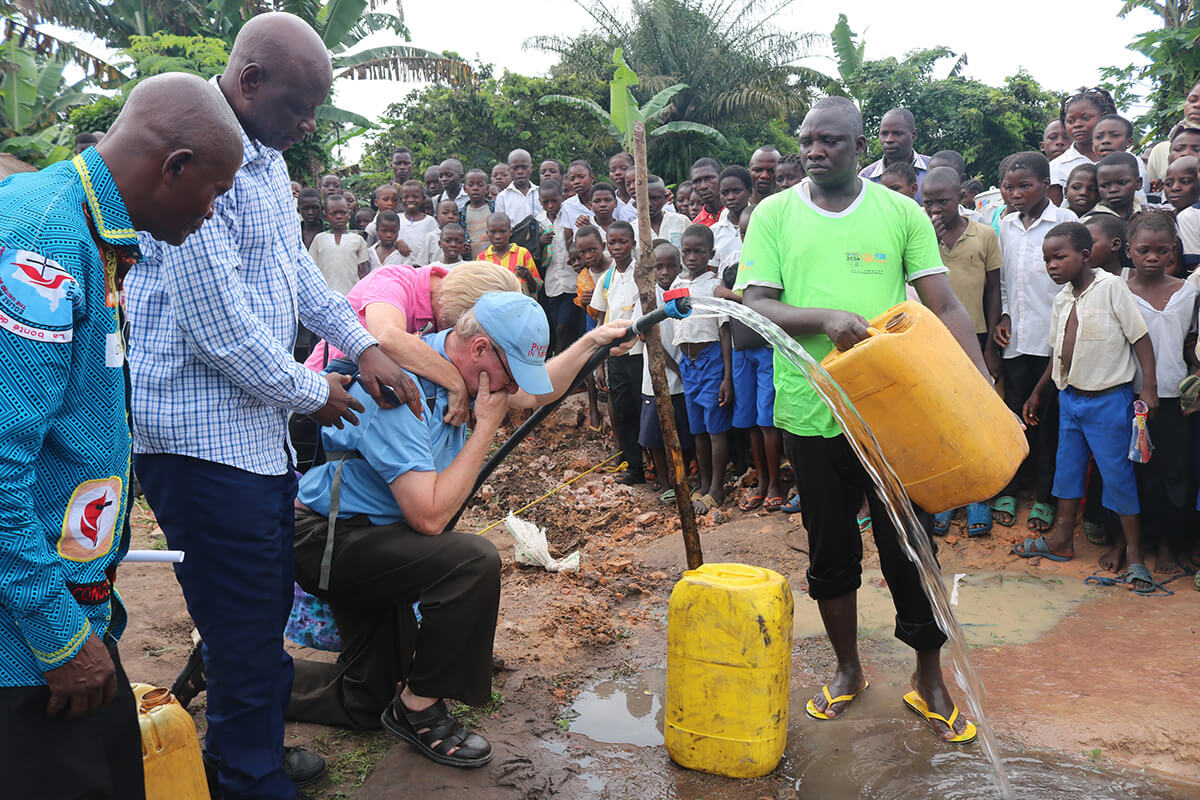Key points:
- The Bakers had been working with partners in the Congo for several years before training in March 2015 to serve full time there.
- After a retreat in 2012, the Rev. Jonathan Baker had felt God directing him to two priorities: his family and the Congo.
- “Living into the dreams of the people who have struggled for many years to have sufficient medical equipment, fresh water and other medical resources brought so much joy to my heart,” Donna said.
For the Rev. Jonathan and Donna Baker, becoming missionaries was a step of faith, guided by a clear feeling that God was calling them to serve in the Democratic Republic of Congo.
In 1999, Jonathan was directing the Peninsula-Delaware Conference Council on Ministries, working with Bishop Peter D. Weaver.
“Our denomination had invited each annual conference to partner with an African country through Hope for the Children of Africa,” Jonathan said. The denomination’s Council of Bishops launched the Hope for the Children of Africa appeal in 2000 to address needs on the continent.
“The Democratic Republic of Congo was engaged in a tragic civil war, and it became apparent God wanted us to partner with the DRC,” he said. “That began my relationship with Congo, evolving into the Congo Partnership.”
The Peninsula-Delaware Conference launched the Congo Partnership in 2001. Renamed the Peter D. Weaver Congo Partnership in 2004, the initiative today also includes the Central Congo Episcopal Area, Eastern Pennsylvania Conference and Western North Carolina Conference.
“My love for Congo grew as I tried to balance my local church and conference responsibilities with my passion to spend more time in mission,” Jonathan said. After a two-month renewal leave in 2012, Jonathan felt that God was giving him two priorities: family and Congo.
“I had no idea where this would take me,” he admits, “but that was the beginning of my transition from the local church to full-time missionary work.”

After retiring from his conference position in March 2013, Jonathan participated in the 100th anniversary of Methodism in Central Congo. “Bishop Peggy Johnson asked Global Ministries to consider my wife, Donna, and me as full-time missionaries to central Congo. The rest is history.”
“I retired from my career as a medical consultant specializing in clinical informatics on Dec. 31, 2014,” Donna said. “I had only traveled to Congo twice previously — in 2004 to learn more about the existing projects and in 2012 to lead a cataract surgery mission in Kinshasa.”
‘Jesus is here’ in Congo

Photo courtesy of Bishop Weaver.
The couple began training to serve full time beginning in March 2015. They quickly learned that people expected them to do many things for them.
“It was a challenge,” Jonathan said, “to help them understand we were there to collaborate with them and to help them find ways to become self-supporting and not depend upon us or others. Self-sufficiency became our mantra, but it was incredibly challenging, especially when the need was so great.
“My primary role was, and still is, to work in partnership with the Congolese leadership to determine the direction of our mission,” he explains. “Nothing happens without the direction and/or consent of the Congo leadership. When we became missionaries, I was the liaison between the U.S. partners and our Congo partners. The Congolese provide leadership for all our projects, and we encourage, support and provide accountability for our donors and the episcopal area.”
Kinshasa was the location of their first project, Mpasa Medical Center.
“It evolved into a medical center and feeding program,” Jonathan said. “We were able to help them expand their outreach, including the construction of a new pediatric building and surgical center. Solar power provided electricity for the first time, enabling them to use equipment like incubators, diagnostic equipment, operating lights, and we even developed a blood bank now that we had refrigeration.”
When veteran mission volunteer Susie Keefer launched Miriam’s Table in 2014, Jonathan and Donna collaborated with her and her board to expand the program.
The Bakers had begun their work in Congo with Bishop Fama Onema in 2004.
“While the Congo was still recovering from a devasting civil war,” Jonathan said, “he asked me to travel to the upcountry, where no missionary had traveled over the previous five years because of the war. I witnessed the incredible devastation but also the potential for our partnership at that time.
“When Bishop David K. Yemba became the episcopal leader, we met together at least once yearly to plan for our mission and the priorities of the partnership. We developed a covenant agreement, which still exists today, reminding one another that we are equal partners and both Congo and U.S. partners have much to offer. We had the privilege to collaborate with Bishop Yemba and now Bishop Daniel O. Lunge in addressing these challenges together.”

“Living into the dreams of the people who have struggled for many years to have sufficient medical equipment, fresh water and other medical resources brought so much joy to my heart,” Donna said. “When a nurse dropped to her knees as I handed her a glucometer for her remote medical center (they had none, which had led to multiple deaths due to insufficient care), I hugged her with tears flowing.”
The Bakers served as missionaries until 2018. Today they are what Jonathan calls “reimaged,” not retired, in Florida, and they go eagerly to area churches to tell the story of the partnership and raise funds for mission.
“The Congolese people can do the work,” he said. “They just need resources like money, training, coaching and lots of prayer. Our people in the U.S. need perspective that only comes when you have traveled and experienced other people and cultures. Everyone can’t go to Congo, but we can bring Congo to them — heart and soul.”
Dunlap-Berg is a freelance writer in Carbondale, Illinois.
News contact: Julie Dwyer at [email protected]. To read more United Methodist news, subscribe to the free UM News Digest.





